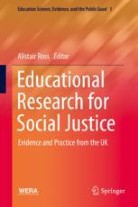
About this book series
This book series takes an analytic perspective on the theoretical underpinnings and practical examples of use of scientific evidence from education research to inform educational policy and practice in an international context. It examines a wide range of topics, including assessment and evaluation, educational administration and school governance, teaching and teacher education, education and workforce transitions, the structure of the curriculum, and policy. It ties in with current debates about the purpose and form of education in an era of post-truth, rapid technological change, globalization, demographic and political shifts, and growing economic inequities. With the contributions from national and international education research associations, organizations, and institutions, the series aims to ask, “What have we learned from the use of science as evidence in educational policy, research and practice that can support democratic, humanistic, and morally responsible development for individuals and societies in different regional and international contexts?” Thus, the main focus of the series is to explore the ways in which the use of scientific evidence in education has informed and transformed the relationships between research, policy, and practice for the public good in the regional and international levels.
Each book in the series demonstrates how the discourses and practices of scientific inquiry and evidence in education have evolved by providing empirical case examples and best practices of evidence use. The following questions will guide each book in the series:
- What constitutes scientific evidence and the public good?
- How are evidence, scientific inquiry and public good defined in different regional and international contexts?
- What ongoing and historical conversations and discourses on using science as evidence in the field of education already exist in different regional and international contexts?- What are the past successes and failures of using scientific evidence in education for the sake of the public good, as well as current work and future possibilities?
- How does scientific evidence and research serve the public good in educational policy and practice at regional and global levels? What are the case examples and best practices of use of science as evidence to serve the public good?- How are the discourses and practices of using science as evidence informing and transforming the relationships between educational research, policy, and practice for the public good in different regional and international contexts?
- What kind of role should national education research associations and international education research institutions and organizations play in generating and distributing scientific evidence to serve the public good?
This book series:
- Is unique in its inclusion of an international advisory group of national and international research associations, organizations, and institutions to contribute to the series and the relevance of the context in which each book resides.- Addresses the complex relations between theory, research, evidence, policy, and practice in education.
- Provides compelling research and case examples of the research- policy nexus.- Calls for a new epistemology and axiology of practice that stresses analytic thinking, reflection, and intellectual discovery.
- Fills a much needed gap in the literature.
Series Editors:
Mustafa Yunus Eryaman, WERA President-elect
Barbara Schneider, Michigan State University, WERA Council member
Felice J. Levine, American Educational Research Association, WERA Past president
Ingrid Gogolin, University of Hamburg, WERA President
Editorial Board Members:
Stephen Lamb, Victoria University, Australia
Jonathan Jahnsen, University of Free State, South AfricaKatariina Salmela-Aro, University of Helsinki, Finland
Alistair Ross, London Metropolitan University, UK
Dennis Beach, University of Gothenburg, Sweden
Tony Tam Wing, Chinese University of Hong Kong
Ong Kim Lee, Ohio University, USA
Nelofer Halai, Aga Khan University, Pakistan
Geovana Lunardi Mendes, Universidade do Estado de Santa Catarina, Brazil
Stéphan Vincent-Lancrin, OECD, France
- Electronic ISSN
- 2524-843X
- Print ISSN
- 2524-8421
- Series Editor
-
- Mustafa Yunus Eryaman,
- Barbara Schneider,
- Felice J. Levine,
- Ingrid Gogolin
